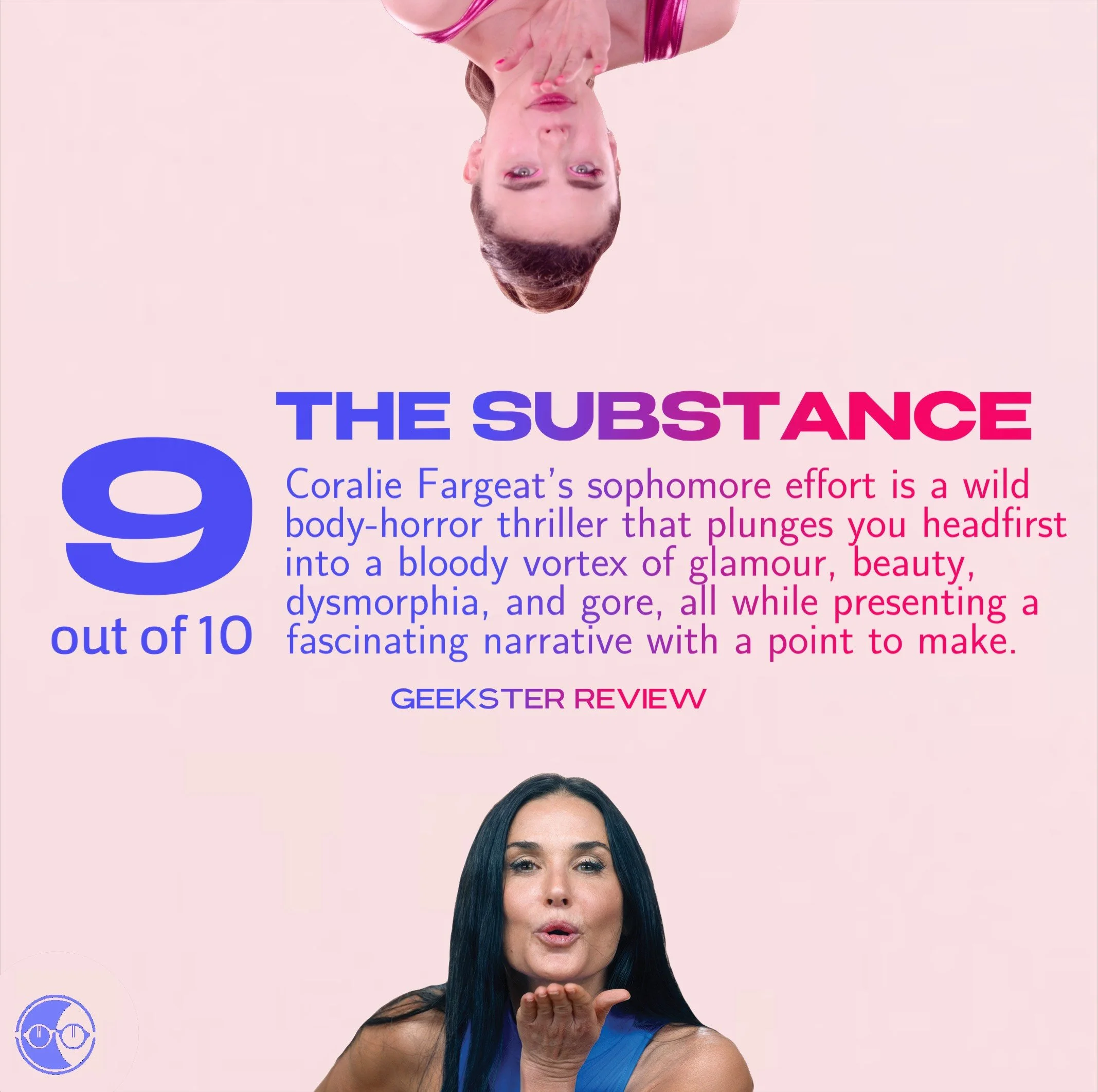The Substance Review
‘The Substance’ is a delightfully horrifying experience. The second feature film from writer/director Coralie Fargeat (who made her breakthrough with 2017's "(Revenge’) is an unapologetically repulsive body horror thriller with a lot to say about objectification, aging, and our shallow culture. It's also hilarious, gorgeous, disgusting, and smart in all the greatest ways, building up to a gonzo third act that could only be carried off by a confident and powerful artist like Fargeat.
The film is not for everyone, and for a variety of reasons, people may object to it, but it is a fantastic cinematic experience that cements Fargeat's reputation as formidable and commendable
The Substance follows the story of fading Hollywood star Elisabeth Sparkles (Demi Moore). She was once a celebrity, but now she hosts a famous television aerobics show in her alleged golden years. On her 50th birthday, she gets let go from her program. To make matters worse, she has a severe automobile accident after having her billboard removed. However, in times of crisis, opportunities might arise.
At the hospital, where she has not been injured by the accident, a young nurse surreptitiously offers Elisabeth a flash drive labeled "The Substance". It promotes an experimental serum that, when administered, results in a younger, more attractive "perfect" version of the person. The two entities exist as one. She accepts the offer, despite her deep melancholy about the loss of her youth and purpose. But little does she realize that her youthful self is more difficult than she expected.
Fargeat, like in Revenge, provides startling pictures of austere beauty to balance the gory brutality, genre subversiveness, and black comedy. However, The Substance is all about overstatement and excess. Fargeat elevates her directing abilities as she depicts the commonplace, normalcy, and strangeness of human behavior with a flash of adrenaline.
The cinematic panache injects a felt amount of energy that makes the wild tone shifts and story points palatable and enjoyable, thanks to the unruly use of the camera (by Promising Young Woman cinematographer Benjamin Kracun), the propulsive score by Raffertie, and the frenetic editing (by Fargeat and repeat collaborators Jerome Eltabet and Valentin Feron), which includes extreme close-ups, wide-shots, crash zooms, Dutch angles, slow-motion, and many other cinematic choices. Fortunately, the style isn't only about bells and whistles. The technique is used here to weaponize its pictures against the grossness of the male gaze while also conveying the struggles women confront with self-esteem, body image, and beauty standards without guilt, subtlety, or insincerity.
It's tied together by Demi Moore's brilliant performance as Elisabeth Sparkles. Moore is primarily renowned for her strong, and to a lesser extent vulnerable, performances. In the case of The Substance, Fargeat offers Moore enough of chance to demonstrate her acting abilities, encapsulating everything that made Moore an acting superstar while also showcasing acting chops that we seldom see from Moore. Her episodes of fury and animosity toward herself are both figuratively interesting and comically grim. Moore's bouts of anxiousness and debilitating sadness midway through the film, however, are what make her such an outstanding performer.
Moore in layers upon layers of complex make-up effects (headed by the excellent CLSFX Atelier 69 company, which has worked on films such as Titane and Smoking Causes Coughing) in the metamorphosis of bodily horror is just delicious frosting on the cake.
However, despite the contemporary and tragic topics on show, Fargeat is not ashamed to laugh at the absurdity of the concept. Along with her striking style and expressionistic storytelling, her proclivity for genre references is wildly effective, with nods to classic literature like The Picture of Dorian Gray, classic cinema like Sunset Boulevard (1950), '70s transgressive cinema like Troma Entertainment, and '80s pop culture via Jane Fonda's Workout.
Margaret Qualley continues her impressive run as Young Elisabeth Sparkle. She is no stranger to bringing physicality and vivacity to her performances, and her work emphasizes the character's impulsiveness and cunning with gusto as she makes the world her oyster. Of course, the presence of Dennis Quaid is delightfully strange, unpleasant, and hilariously amusing. Whether he's masticating so much shrimp that the ocean phoned to say they're running out or squeezing the lemon while answering a phone call with loud bombast about dismissing an employee, Quaid relishes his part.
In terms of weaknesses, the third act takes such a radical swing in storytelling that some spectators may be put off by its courageousness. And others who want depth and complexity in its messaging may find the straightforward narrative used to communicate its principles condescending. The last nail in the coffin is that the film's disputes over its topics are not always thought-provoking, making The Substance appear shallow. That might be Fargeat's goal with her film. The atrocious lack of interest in what is wrong with our patriarchal and meretricious culture.
The Substance is a dose of cinematic horror adrenaline that is incredibly exciting, brilliantly bizarre, and operatically violent. It demonstrates Coralie Fargeat's tremendous voice in horror and serves as a reminder that Demi Moore is a dazzling light who has never left us.





